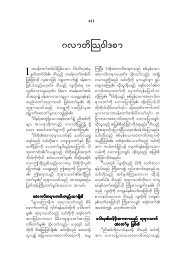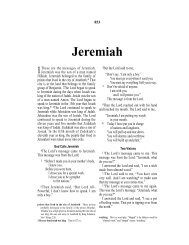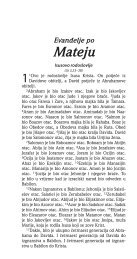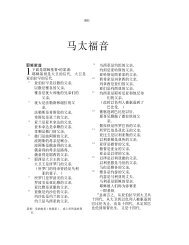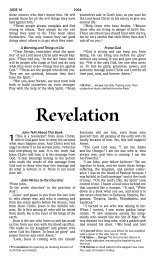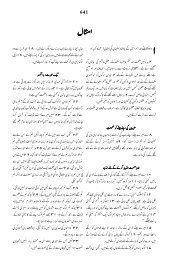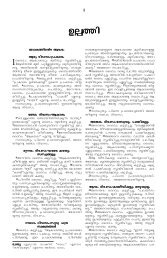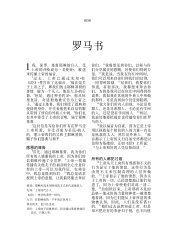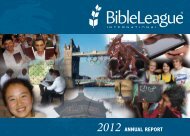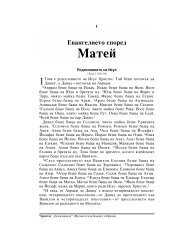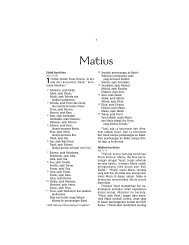English Version for the Deaf
English Version for the Deaf
English Version for the Deaf
You also want an ePaper? Increase the reach of your titles
YUMPU automatically turns print PDFs into web optimized ePapers that Google loves.
INTRODUCTION viii<br />
God told Abraham to leave his home in Mesopotamia and led him to Canaan (later<br />
called <strong>the</strong> land of Israel, which was approximately <strong>the</strong> same geographical area<br />
known today as Palestine). In his old age Abraham had a son named Isaac, who had<br />
a son named Jacob. Jacob (also called Israel) had twelve sons and a daughter. This<br />
family became <strong>the</strong> nation of Israel, but it never <strong>for</strong>got its tribal origin. It continued<br />
to refer to itself as <strong>the</strong> twelve tribes of Israel—descendants of <strong>the</strong> twelve sons of<br />
Jacob: Reuben, Simeon, Levi, Judah, Dan, Naphtali, Gad, Asher, Issachar, Zebulun,<br />
Joseph, and Benjamin. The three main ancestors—Abraham, Isaac, and Jacob<br />
(Israel)—are known as <strong>the</strong> “fa<strong>the</strong>rs” or “patriarchs” of Israel.<br />
Abraham was also a “fa<strong>the</strong>r” of ano<strong>the</strong>r kind. Many times in ancient Israel, God<br />
called certain people to speak <strong>for</strong> him. These special people, or prophets, were<br />
God’s representatives to <strong>the</strong> rest of his people. Through <strong>the</strong> prophets God gave <strong>the</strong><br />
people of Israel promises, warnings, laws, teachings, lessons drawn from past<br />
experiences, and lessons based on future events. Abraham “<strong>the</strong> Hebrew” is <strong>the</strong> first<br />
prophet mentioned in <strong>the</strong> Scriptures.<br />
ISRAEL SET FREE FROM SLAVERY<br />
The family of Jacob (Israel) grew to include about 70 of his direct descendants. One<br />
of his sons, Joseph, became a high official in Egypt. Times were hard, so Jacob and<br />
his family moved to Egypt, where <strong>the</strong>re was plenty of food and life was easier. This<br />
tribe of Hebrews grew to be a small nation, and <strong>the</strong> Pharaoh (<strong>the</strong> title or name of <strong>the</strong><br />
king of Egypt) made <strong>the</strong>m serve as slaves. The book of Exodus tells about how<br />
finally, after 400 years, God used <strong>the</strong> prophet Moses to free <strong>the</strong> people of Israel from<br />
slavery and lead <strong>the</strong>m eventually to settle again in Palestine. The price <strong>for</strong> freedom<br />
was high, but <strong>the</strong> Egyptians were <strong>the</strong> ones who had to pay. God punished <strong>the</strong>m with<br />
a series of ten plagues, demanding with each one that his chosen people be set free.<br />
But following each disaster, <strong>the</strong> king stubbornly refused to free <strong>the</strong>m. The final<br />
plague, however, brought about <strong>the</strong> death of <strong>the</strong> firstborn sons of all <strong>the</strong> families of<br />
Egypt, including <strong>the</strong> Pharaoh’s son. This caused <strong>the</strong> king finally to agree to let <strong>the</strong><br />
Israelites go free.<br />
The people of Israel had been given special preparations to make <strong>for</strong> <strong>the</strong>ir trip to<br />
freedom. Dressed and ready <strong>for</strong> <strong>the</strong> escape, each family killed and roasted a lamb.<br />
They put <strong>the</strong> blood from <strong>the</strong> lamb on <strong>the</strong>ir doorposts as a special sign to God. They<br />
hurriedly baked bread without yeast and ate <strong>the</strong>ir meal. That night <strong>the</strong> Angel of <strong>the</strong><br />
Lord went through <strong>the</strong> land. If <strong>the</strong> blood of <strong>the</strong> lamb was not on <strong>the</strong> doorposts, <strong>the</strong><br />
firstborn of that family died. This is why <strong>the</strong> firstborn sons of <strong>the</strong> Egyptians were<br />
put to death, while <strong>the</strong> Angel “passed over” <strong>the</strong> homes of God’s people. This night<br />
and <strong>the</strong> events surrounding it were later remembered in many ways in <strong>the</strong> worship<br />
and sacrifices of <strong>the</strong> people of Israel.<br />
After <strong>the</strong> Israelite slaves were set free and were leaving Egypt, <strong>the</strong> Pharaoh<br />
changed his mind again. He sent his army to catch <strong>the</strong>m and bring <strong>the</strong>m back, but<br />
God saved his people. He divided <strong>the</strong> Red Sea, making a path through it to lead<br />
<strong>the</strong>m to freedom on <strong>the</strong> o<strong>the</strong>r side. Then he released <strong>the</strong> waters to destroy <strong>the</strong> army<br />
of Egyptians that was following <strong>the</strong>m. After Moses led <strong>the</strong> people in a song of<br />
praise to God <strong>for</strong> his protection and kindness, he led <strong>the</strong>m on a long and difficult<br />
journey. Finally, <strong>the</strong>y came to a mountain in <strong>the</strong> desert of Sinai on <strong>the</strong> Arabian<br />
Peninsula, where God made a special agreement with his people.



